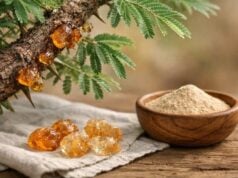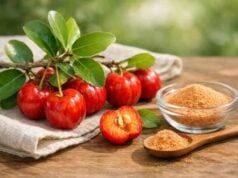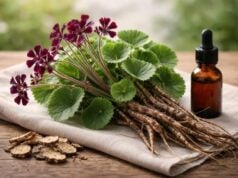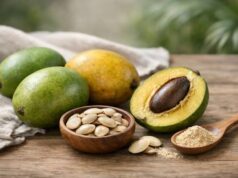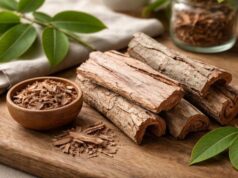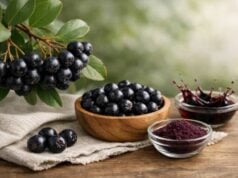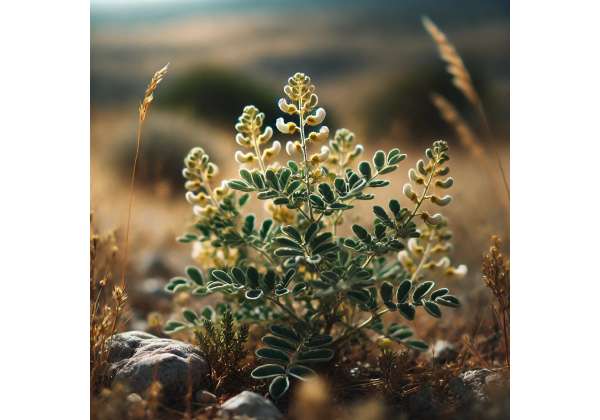
Astragalus (Astragalus membranaceus) is a classic root used in traditional Chinese medicine, where it is often called huang qi. Today it is commonly taken as a tea, capsule, tincture, or powdered extract—especially during seasons when people want extra immune and respiratory support. Its popularity is easy to understand: astragalus contains a distinctive mix of polysaccharides, saponins (including astragalosides), and flavonoids that appear to influence immune signaling, inflammation pathways, and cellular stress responses.
What matters most for readers, though, is the practical question: what can astragalus realistically help with, and how should you use it safely? The evidence is strongest for “support” roles—helping the body respond to stressors, complementing healthy habits, and in some contexts serving as an add-on alongside standard care. It is not a substitute for medical treatment, and it is not a one-size-fits-all supplement, especially for people taking immunosuppressive drugs or managing autoimmune conditions.
This guide breaks down what’s in astragalus, what the research actually suggests, how to choose and use it, and how to dose it with clear safety guardrails.
Essential Insights
- May support immune function and respiratory resilience when used consistently during higher-risk seasons.
- Some evidence suggests benefits for kidney and metabolic markers when used as an adjunct in studied settings.
- Typical oral ranges are 500–1,500 mg/day of extract or 9–30 g/day of dried root in decoction, depending on form and goal.
- Avoid with immunosuppressant therapy (for example, transplant medications) and use caution with autoimmune conditions.
- Stop at least 2 weeks before surgery and avoid if pregnant or breastfeeding unless a clinician advises otherwise.
Table of Contents
- What is astragalus root?
- Key ingredients and medicinal properties
- Does astragalus support immunity?
- Heart, kidneys, and blood sugar
- How to use astragalus
- How much astragalus per day?
- Safety, interactions, and evidence
What is astragalus root?
Astragalus is the dried root of Astragalus membranaceus (and closely related species used in traditional systems), a plant in the legume family. In traditional Chinese medicine (TCM), it is most often described as a “qi-tonifying” herb—language that can sound unfamiliar, but the modern translation is fairly practical: it has been used to support stamina, recovery, and resistance to seasonal illness, especially when someone feels run down or “low energy.”
Common names and identity matters
You may see astragalus labeled as huang qi, milk vetch root, or astragalus root. One important buyer’s detail is that “astragalus” can refer to many species in the Astragalus genus. Supplements generally aim to use A. membranaceus or A. mongholicus, which are the most commonly referenced in modern research and traditional practice. Reputable products should state the Latin name, the plant part (root), and ideally the extraction ratio if it is an extract.
How it is traditionally prepared
Astragalus root is typically simmered rather than steeped briefly. That matters because some of its key constituents—especially polysaccharides—are more likely to be extracted with longer hot-water preparation. In TCM cooking, astragalus is sometimes added to soups and broths for a gentle, food-like approach. The taste is mildly sweet and earthy, and it pairs well with warming spices.
What astragalus is not
Astragalus is often described online as an “immune booster,” but that wording can be misleading. Immune function is not just about stronger or faster—healthy immunity is balanced, responsive, and not overly reactive. Astragalus appears better described as an immunomodulator: it may influence signaling and coordination rather than simply “turning immunity on.”
It is also not interchangeable with every product that mentions “astragaloside” or “telomerase.” Some specialty supplements isolate compounds derived from astragalus, and their effects and safety profiles may differ from whole-root preparations. If your goal is general immune resilience, most people start with whole-root tea, powder, or a moderate-dose extract rather than jumping straight to highly specialized formulas.
Key ingredients and medicinal properties
Astragalus has a layered chemistry, and understanding it helps you choose the right form. Some products behave more like a traditional decoction herb, while others are concentrated extracts aimed at a narrower outcome. The most discussed compound families are polysaccharides, saponins, and flavonoids.
Polysaccharides: immune signaling support
Astragalus polysaccharides (often abbreviated as APS) are large carbohydrate molecules that appear to interact with immune receptors involved in pattern recognition and signaling. In practical terms, polysaccharides are one reason astragalus is associated with resilience during stressful seasons: they may influence how immune cells “communicate,” including the balance of certain cytokines and the activity of macrophages and natural killer cells.
Polysaccharides are more prominent in hot-water extracts and well-prepared root decoctions. That is one reason traditional simmering can matter: a quick tea bag steep is not the same as a true decoction.
Saponins: astragalosides and cellular stress response
Astragalus also contains triterpenoid saponins, including astragaloside IV, which is sometimes used as a marker of quality. Saponins are often explored for roles in inflammation pathways, oxidative stress response, and metabolic signaling. In supplements, products may state “standardized to astragalosides” or “astragaloside IV,” but labeling is inconsistent across brands. A higher number is not automatically better; it depends on your tolerance, goal, and safety profile.
Flavonoids: antioxidant and vascular themes
Flavonoids such as calycosin and related isoflavonoids add another layer, with potential relevance to antioxidant activity and blood vessel function. While antioxidant talk is common in marketing, the more useful takeaway is this: flavonoids can influence cellular signaling, not just “mop up free radicals.” That distinction helps explain why benefits may show up as subtle changes in inflammation-related markers or recovery patterns rather than dramatic, immediate symptom relief.
Medicinal properties in plain language
When you combine those constituents, astragalus is best characterized as having potential:
- immunomodulatory properties (supporting balanced immune responses)
- anti-inflammatory signaling effects (context-dependent, not a blanket anti-inflammatory)
- antioxidant and stress-response support (more relevant over weeks than days)
- metabolic and organ-support signals (seen most often in studied add-on settings)
A practical way to apply this: if your goal is daily resilience, a traditional-style preparation or moderate extract is often enough. If you are targeting a clinical endpoint (for example, metabolic markers), you should treat astragalus as an adjunct and be more selective about product type, dosing, and medical oversight.
Does astragalus support immunity?
Immune support is the most common reason people try astragalus, and it is also where expectations can drift into hype. The best way to evaluate it is to separate three questions: prevention, severity, and recovery.
Seasonal resilience and respiratory comfort
Astragalus is typically used as a preparedness herb—something taken consistently during seasons when colds circulate or when sleep and stress are not ideal. The most credible expectation is not that it “blocks infection,” but that it may support immune readiness and reduce how depleted you feel when exposed to everyday stressors. In real life, people often notice effects as fewer “dragging” days, easier recovery from mild respiratory symptoms, or steadier energy during busy weeks.
Immune modulation, not a simple boost
A common misunderstanding is that stronger immunity is always better. Overactive immunity can worsen inflammatory conditions, and immune-suppressing drugs exist for a reason. Astragalus is better framed as a modulator: it may influence signaling pathways that coordinate immune responses. That is also why it is not appropriate for everyone, especially without guidance for people with autoimmune disease or those taking immunosuppressants.
How to position astragalus among other immune herbs
If your goal is a short-term “acute cold” approach, astragalus is not always the first choice. Many people prefer a different strategy for early symptoms and reserve astragalus for baseline support. For example, echinacea for short-term cold support is often discussed for brief, time-limited use, while astragalus is more commonly used for steady, seasonal routines.
Practical ways to use it for immune goals
A realistic immune-support routine usually looks like this:
- Consistency over intensity: daily use for several weeks during higher-risk periods.
- Lifestyle pairing: adequate sleep, protein intake, hydration, and hand hygiene.
- Simple tracking: note how often you get sick, how long symptoms last, and how quickly energy returns.
- Clear stop rules: stop if you develop unusual rashes, significant digestive upset, or if you begin an immunosuppressive medication plan.
Astragalus can be a helpful piece of an immune-support plan, but it is rarely the whole plan. When used thoughtfully, it tends to shine as a steady, low-drama habit rather than a “miracle” intervention.
Heart, kidneys, and blood sugar
Beyond immunity, astragalus is widely researched in supportive roles related to cardiovascular and kidney health, as well as metabolic markers. This is also where you need the most caution about interpretation: many studies involve combination therapies, different preparations (including injectables in some settings), and variable study quality.
Kidney support as an adjunct
Astragalus has a long history of use in kidney-focused TCM formulas, and modern research often explores it as an add-on alongside standard care. In studied contexts, outcomes may include changes in protein in urine, creatinine-related markers, or other indicators of kidney stress. A key practical point is that astragalus is not a replacement for established kidney-protective care (such as blood pressure control, glucose management, and clinician-directed medications). Instead, it may be considered a supportive add-on in carefully monitored situations.
If you have chronic kidney disease, product choice matters. Whole-root tea is not automatically safer than extracts, and dosing should be conservative. People with reduced kidney function also need to be mindful of supplement contamination risks (for example, heavy metals) because the margin for error can be smaller.
Heart-related outcomes and circulation themes
Some research explores astragalus in heart failure and circulation-related contexts, often as an add-on. While this is promising, it is not a self-treatment pathway. Heart conditions require structured medical care, and “feeling better” can sometimes mask worsening physiology. If you are exploring botanical support in a cardiovascular plan, it can be helpful to compare with herbs that are traditionally framed for the heart, such as hawthorn for cardiovascular support, while keeping expectations modest and clinician involvement high.
Blood sugar and metabolic markers
Astragalus is sometimes taken for glucose support and metabolic resilience. In research settings, it is often studied as an adjunct to standard medications, with outcomes such as fasting glucose or longer-term markers. The practical takeaway is not that astragalus replaces diabetes treatment, but that it may influence metabolic signaling enough to matter for some people.
That possibility creates a safety rule: if you use astragalus while taking glucose-lowering medications, you should monitor for symptoms of low blood sugar (shakiness, sweating, confusion) and discuss changes with your clinician.
Overall, astragalus fits best in organ and metabolic goals when it is used as a supportive, monitored adjunct, not as a substitute for standard care.
How to use astragalus
Astragalus can be used like a traditional food-herb, like a structured supplement, or both. The best option depends on your goal, your tolerance, and how precise you want dosing to be.
Dried root decoction (traditional method)
This is the classic approach and often the most cost-effective.
- Simmer sliced dried root in water for 20–40 minutes.
- Drink the liquid warm or room temperature.
- Many people prepare a larger batch and refrigerate it for 1–2 days.
Decoction tends to be better than quick steeping for pulling out polysaccharides, and it is usually gentler than high-concentration extracts.
Powder, granules, and capsules
These are convenient and consistent, but quality varies. Look for:
- the Latin name (Astragalus membranaceus or a clearly stated equivalent used in the product)
- the plant part (root)
- an extraction ratio (for example, 5:1 or 10:1) if it is an extract
- third-party testing for contaminants when possible
Powders can be mixed into warm water or smoothies, but they may cause digestive discomfort if you start too high. Capsules are easier for titration because you can increase in smaller steps.
Tinctures and liquid extracts
Tinctures are useful for people who want flexible dosing without swallowing capsules. Because extraction methods vary (water, alcohol, dual extract), the label dose can be difficult to compare across brands. For tinctures, consistency is key: choose one product, use it steadily, and evaluate over several weeks.
Stacking and seasonal “toolkits”
Some people combine astragalus with other herbs during cold season. The safest way to do this is to avoid “everything at once” blends when you are new. If you want an acute-symptom herb to use separately (not stacked blindly), andrographis for short-term immune support is one example people reserve for brief windows, while keeping astragalus as a baseline habit.
Common mistakes to avoid
- Using it only when you are already sick: astragalus is typically better as a consistent routine than as a last-minute fix.
- Changing multiple supplements at once: it becomes impossible to tell what helps or harms.
- Ignoring product identity: “astragalus” without the Latin name is not enough.
Used thoughtfully, astragalus can fit into daily life in a simple, low-effort way—especially as a decoction or a moderate-dose extract.
How much astragalus per day?
Astragalus dosing depends heavily on form. A simmered root decoction, a powdered root capsule, and a concentrated extract can deliver very different amounts of active constituents, even if they look similar on a shelf. Use the ranges below as practical starting points, and favor consistency over high doses.
Typical adult dosing ranges by form
Dried root (decoction)
- Common traditional range: 9–30 g/day of dried root simmered as a decoction.
- Practical start: 9–15 g/day for 1 week, then adjust based on tolerance and goal.
Powdered root
- Typical range: 1–3 g/day, often split into 1–2 doses.
- Practical start: 1 g/day for several days before increasing.
Standardized extract (capsules or tablets)
- Common label ranges: 500–1,500 mg/day of extract, often split into 1–2 doses.
- If the label lists an extraction ratio (for example, 10:1), treat the dose as “stronger per milligram” and start at the low end.
Granules (concentrated decoction form)
- Often used at 1–3 g/day, depending on concentration; follow brand instructions and start low.
Timing: morning, afternoon, or evening?
Astragalus is usually taken earlier in the day because some people find it gently energizing. If you are sensitive to stimulating effects, take it with breakfast or lunch. If digestion is your limiting factor, take it with food and consider splitting the dose.
Duration and evaluation windows
For immune resilience, a reasonable evaluation window is 4–8 weeks. For metabolic or organ-support goals, people often evaluate over 8–12 weeks, ideally with clinician-guided lab monitoring if you are targeting kidney or glucose markers.
Adjustments and personalization
- If you feel “wired,” reduce dose or shift earlier.
- If you feel stomach upset, reduce dose and choose decoction over capsules for a gentler approach.
- If you want an adaptogen-style comparison, consider reading about Asian ginseng for energy and stress resilience, which is often positioned differently than astragalus even though both are used for stamina in traditional systems.
Dosing works best when you treat astragalus like a structured experiment: start low, stay consistent, and change only one variable at a time.
Safety, interactions, and evidence
Astragalus is widely used and often well tolerated, but “natural” does not mean risk-free. Safety depends on your health context, your medications, and how concentrated your product is. This section focuses on the most practical guardrails.
Common side effects
Most side effects are mild and may include:
- digestive discomfort (bloating, nausea, loose stools)
- headache (occasionally)
- skin reactions (rash or itching in sensitive individuals)
If side effects occur, reducing the dose or switching to a decoction often helps. Stop use if symptoms persist.
Who should avoid astragalus
Avoid astragalus unless a qualified clinician explicitly approves it if you are:
- taking immunosuppressant medications (for example, after an organ transplant)
- managing an autoimmune disease with active symptoms or immune-targeting drugs
- pregnant or breastfeeding
- scheduled for surgery (a conservative approach is to stop 2 weeks before)
- allergic to legumes or have a history of significant supplement reactions
People undergoing cancer treatment should also be cautious. Even when astragalus is studied in supportive settings, treatment plans are complex and individualized, and immune-active supplements can complicate care.
Medication interactions to treat seriously
Use extra caution and consult your clinician if you take:
- immunosuppressants (potentially counterproductive or unpredictable immune effects)
- anticoagulants or antiplatelet drugs (interaction risk depends on your full regimen and health status)
- diabetes medications (possible additive glucose-lowering in some people)
- blood pressure medications (especially if you trend low)
What the evidence actually says
Astragalus research includes human trials, but quality varies. Common limitations include small study sizes, inconsistent product preparation, and frequent use as part of multi-herb formulas. The strongest signals tend to appear when astragalus is used as an adjunct in a structured plan (for example, alongside standard care), rather than as a standalone cure.
A helpful rule is to treat astragalus like you would other immune-support supplements: it may improve resilience and certain markers over time, but it is unlikely to produce dramatic outcomes on its own. If you are tempted to stack multiple immune-active products, consider simplifying—adding one tool at a time. For comparison, reishi mushroom supplement basics can help you see how another popular immune-active supplement is typically framed, including dosing and safety cautions.
Astragalus can be a useful, steady support for the right person. The “right person” is someone who can use it consistently, match the form to their goal, and respect the interaction and avoidance rules above.
References
- Astragalus: Usefulness and Safety | NCCIH 2025 (Government Health Resource)
- Effect of Astragalus membranaceus on left ventricular remodeling in HFrEF: a systematic review and meta-analysis – PMC 2024 (Systematic Review and Meta-Analysis)
- Efficacy of astragalus combined with renin-angiotensin-aldosterone system blockers in the treatment of stage III diabetic nephropathy: a systematic review and meta-analysis – PubMed 2024 (Systematic Review and Meta-Analysis)
- Efficacy of Astragalus Membranaceus (Huang Qi) for Cancer-Related Fatigue: A Systematic Review and Meta-Analysis of Randomized Controlled Studies – PMC 2025 (Systematic Review and Meta-Analysis)
Disclaimer
This article is for educational purposes only and does not provide medical advice. Astragalus can cause side effects and may interact with medications, especially immunosuppressants, blood sugar-lowering drugs, blood pressure medicines, and anticoagulant or antiplatelet therapies. If you are pregnant or breastfeeding, have an autoimmune condition, are preparing for surgery, have a chronic medical condition (including kidney disease), or take prescription medications, consult a licensed clinician before using astragalus or any new supplement. Stop use and seek medical guidance if you develop an allergic reaction, persistent gastrointestinal distress, or unusual symptoms.
If this guide was useful, consider sharing it on Facebook, X (formerly Twitter), or any platform where you discuss evidence-informed wellness.

